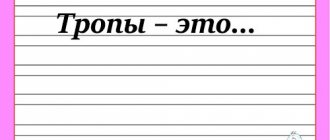Lexical means: tropes
Allegory - Themis (woman with scales) - justice. Replacement of an abstract concept with a concrete image.Hyperbola — Bloomers as wide as the Black Sea (N. Gogol) Artistic exaggeration.Irony - Where are you getting your head from, smart one? (Fable by I. Krylov). Subtle mockery, used in the opposite sense to the direct one. Lexical repetition - Lakes all around, deep lakes. Repetition of the same word or phrase in the textLitota - A small man. An artistic understatement of the described object or phenomenon.Metaphor — Sleepy lake of the city (A. Blok) Figurative meaning of the word based on similarityMetonymy — The class was noisyReplacing one word with another based on the contiguity of two conceptsOccasionalisms - The fruits of education. Artistic means formed by the author.Personification - It is raining. Nature rejoices. Endowing inanimate objects with the properties of living things. Periphrase — Leo = king of beasts. Substitution of a word with an expression similar in lexical meaning.Sarcasm — The works of Saltykov-Shchedrin are full of sarcasm. Caustic, subtle mockery, the highest form of irony.Comparison -When a nightingale speaks a word, it sings. In comparison, there is both that which is compared and that with which it is compared. Conjunctions are often used: as, as if, as if. Synecdoche - Every a penny brings (money) into the house. Transfer of value based on quantitative characteristics.Epithet - “ruddy dawn”, “golden hands”, “silver voice”. A colorful, expressive definition that is based on a hidden comparison.Synonyms - 1) run - rush. 2) The noise (rustle) of leaves. 1) Words that are different in spelling, but close in meaning. 2) Contextual synonyms - words that are similar in meaning in the same context Antonyms - original - fake, callous - responsiveWords with opposite meaningsArchaism - eyes - eyes, cheeks - cheeksAn outdated word or figure of speechTest on the topic
- /10
Question 1 of 10What means of expression are used in our speech?
Start test
Hall of Fame
To get here, take the test.
- Ekaterina Plotnikova
7/10
- Mikhail Zabuga
8/10
- Sergey Efremov
8/10
Syntactic means
Anaphora - The thunderstorm was not in vain. Repetition of words or combinations of words at the beginning of sentences or poetic lines.Antithesis - Long hair - short mind;.Contrast.Gradation - I came, I saw, I conquered! Arrangement of words and expressions in increasing (ascending) or decreasing (descending) significance.Inversion - Once upon a time there lived a grandfather and a woman. Reverse word order.Compositional junction (lexical repetition) - It was a wonderful sound. It was the best voice I've heard in years. Repeating at the beginning of a new sentence words from the previous sentence, usually ending it. Multi-union - The ocean walked before my eyes, and swayed, and thundered, and sparkled, and faded away. Deliberate use of a repeating conjunction.Oxymoron - Dead souls. A combination of words that cannot be combined in meaning.Parcellation - He saw me and froze. I was surprised. Silenced. Deliberate division of a sentence into semantically significant segments. Rhetorical question, exclamation, appeal - What a summer, what a summer! Who hasn’t cursed the stationmasters, who hasn’t sworn at them? Citizens, let's make our city green and cozy! Expressing a statement in interrogative form; to attract attention; increased emotional impact. Series, pairwise combination of homogeneous members - Nature helps to fight loneliness, overcome despair, powerlessness, forget hostility, envy, and the deceit of friends. The use of homogeneous members for greater artistic expressiveness of the textSyntactic parallelism - To be able to speak is an art. Listening is a culture. (D. Likhachev) Similar, parallel construction of phrases and lines. Default - But listen: if I owe you... I own a dagger, / I was born near the Caucasus. The author deliberately understates something, interrupts the hero’s thoughts so that the reader can think for himself what he wanted to say.Ellipsis - Guys - for the axes! (the word “taken” is missing) Omission of some member of the sentence that is easily restored from the context Epiphora - I've been coming to you all my life. I believed in you all my life. Same ending for several sentences.Means of expression in music
The main means of expressiveness of musical composers are:
- mode (usually major or minor);
- dynamics (volume);
- meter, rhythm, tempo (rhythmic measure);
- registers (range of a musical instrument);
- timbre (color or character of sound);
- strokes (separate or connected: staccato, legato, non legato);
- melody (the main musical idea of the composer);
- harmony (learning chords);
- texture (design of polyphony).
Phonetic means: sound recording
Alliteration - Completehsometimes in the swamp depthswAnd/ Hwow wordswbut, damnwsmart wurshat kamawand - a combination of hissing consonants helps to convey the rustling of the reeds. The repetition of consonants creates an image.Assonance - LYublYu birch treesat Ratsskwow It's brightwow, then gratstnwow – conveys slight sadness and tenderness. Repetition of vowels, creating an image.Gradation - I came, I saw, I conquered! The arrangement of words and expressions is in ascending order (inSolve task 26 of the Unified State Exam in the Russian language with answers.
Comparison
The use of comparison gives the author the opportunity to describe a certain phenomenon by comparing it with another phenomenon that has similar characteristics. The comparison can be expressed in the following ways:
- Unions (as if, as if, etc.)
- Instrumental case
- Using the words similar, similar
- Denial
- Comparative degree of an adjective or adverb
When analyzing a literary work, for clarity, you can fill out a table, writing out what is being compared with what.
Stylistic figures of speech
Stylistic figures of speech are syntactic constructions with emotionally expressive shades without additional information; - these are figures of speech, rhetorical figures, statements in the form of a syntactic sentence constructed to enhance expressiveness and imagery; - this is a type of figurative and expressive means, the peculiarity of which lies in the construction of the sentence.
Among the stylistic figures of speech we can highlight*:
- Lexical repetitions (intentional repetitions of words) Anaphora
- Epiphora
- Parallelism
- Asyndeton
- A rhetorical question
* — for the Unified State Examination in literature, it is not necessary to study these subsections; it is enough to simply understand their differences. In the test tasks you will only need knowledge of the terms listed below and the ability to distinguish them from each other.
Contents
Inversion
Inversion is intentionally incorrect word order; violation of direct word order (if in direct order: subjects → predicate → objects, then in sentences with inversion the sequence is violated).
| Examples: |
| “... and wet, steel veins reach my leaves...”, “With a pleasant breath she stole sleep from my eyes,” “God grant that liars close their lips, hearing the voice of God in a child’s cry...”, “... a gentle voice sounded to me for a long time...” , “What happiness has befallen the Fool, the jester, God knows who,” “Hello, wizard of the forest, I have long loved the cheerful splash of the pines, the wine of your berries.” |
Anaphora
Anaphora (single beginning) is the same beginning of adjacent lines in a stanza (sounds, letters, words can be the same). Different stanzas in a poem can begin with the same word, letter, expression - this will also be anaphora.
| Examples: |
| “ God grant that the eyes of the blind can be restored and the backs of the hunchbacks can be straightened. God willing, let me be a god even a little bit, but I can’t be a little bit crucified.” “ Oh , I’m used to these robes of the Majestic Eternal Wife!…. Oh , Holy One, how tender the candles are, How joyful are Your features!...” “ Or is the crime weighing on you? Or is slander from friends poisonous?” “ And if I conquer people with my will, And if inspiration flies to me at night, And if I know secrets - a poet, a sorcerer, Ruler of the universe - the more terrible the fall will be...” “ many thoughts in silence, Many songs to myself folded" |
Epiphora
Epiphora (single ending) is the reverse figure of anaphora. The same ending of adjacent lines in a stanza (sounds, letters, words can be the same).
| Examples: |
| “Baby, We are all a little bit of a horse is a horse in our own way. ” “The best and dearest thing is the Motherland . Your grief is our grief, Motherland ." |
Antithesis
Antithesis (opposition, contrast) is a sharp opposition of phenomena or concepts. The basis is contrast (antonyms are often used).
| Examples: |
| “Refusal goes like a promise: No in words - in reality yes .”, “I was probably born late or early . I don’t understand” “I’m not the first warrior, not the last , The homeland will be sick for a long time”, “And the heart will laugh and will cry ," " The find is hidden in the loss and the joy is hidden in the melancholy " |
Gradation
Gradation is a gradual increase (ascending gradation) or weakening (descending) of semantic meaning.
| Examples: |
| “I’m returning to nature, to myself, to the primordial basis and essence.”, “And the sweet anxieties of sweet days, And the incoherent babbling of the tongue, And the convulsive trembling of the heart, And death and life when meeting her...” “Everything in her was trembling, worried , sang. / And the white light is like a scattering of lights" |
Oxymoron
An oxymoron is a combination of the incongruous (a combination of two mutually exclusive concepts).
A rhetorical question
A rhetorical question is a question that does not require an answer. Placed by the author in a work in order to attract the reader’s attention.
| Examples: |
| “What have we done to nature ? How can we look her in the eyes now ? “And if this is so, then what is beauty ? And why do people deify her ? Is she a vessel in which there is emptiness, or a fire flickering in the vessel ? " |
Rhetorical appeal
Rhetorical appeal is an appeal to someone or something to enhance the expressiveness of speech.
| Examples: |
| “Shut up, Muse of revenge and sorrow!”, “Oh, stubborn tongue ! Why simply - a man" |
Rhetorical exclamation
A rhetorical exclamation is an exclamatory sentence that enhances the emotionality of the statement. R.V. conveys various shades of speech and the human condition.
| Examples: |
| “Oh, I’m used to these robes of the Majestic Eternal Wife ! "What space ! What a will ! What songs and flowers ! " |
Parallelism
Parallelism is similar, often identical construction of sentences.
| Examples: |
| “I envy the way he fights - I was not so simple-minded and brave. I envy the way he laughs - I couldn’t laugh like that as a child.”, “I believe in the quiet: “What are you doing?”, I believe in the bitter: “What are we doing?”,” “Every portrait in him looks suspicious. Every object in it frowned closed.”, ““There is God’s judgment...” - the blizzard roared through the windows. “There is God’s judgment...” - the Volga moaned in the spring.” |
Parcellation
Parcellation is the deliberate division of a sentence into parts.
| Examples: |
| “It’s very difficult for him. It was easier during the war. Life goes on.”, “I’m silent. I look at the sky. I'm stunned. And the blue neckline is visible to me.”, “So love. And kiss. And be silent.", "Wind. Wind. The poplar wind splashed the golden song...” |
Antithesis
Antithesis is a sharp opposition of phenomena or concepts.
| Examples: |
| “Refusal goes like a promise: No in words - in reality yes .”, “I was probably born late or early . I don’t understand” “I’m not the first warrior, not the last , The homeland will be sick for a long time”, “And the heart will laugh and will cry ," " The find is hidden in the loss and the joy is hidden in the melancholy " |
Gradation
Gradation is a gradual increase (decrease) in meaning or emotional significance when listing.
| Examples: |
| “With yellow, faded foliage , tearful, dead haze, the evil October rain taps on the glass,” “To the village , to my aunt , to the wilderness , to Saratov ,” “I don’t regret , I don’t call , I don’t cry is stale bread here shame, Need and eternal oppression , And there are balls, a brilliant courtyard, Freedom and honor "" And where is Mazepa ? where is the villain ? Where did Judas run in fear ? The philosophy here is simple: what, essentially, am I for them - a line, a letter, a comma .” |
Ellipsis
Ellipsis is the deliberate omission of a word, its loss from the text of the poem.
| Examples: |
| All my joys are in a glass, My wardrobe lies in a row, Wealth is in my watch pocket, And my garden is in the Tauride Garden.” ( dash - missing words are/lie), “Wealth is in the watch pocket, And the garden is in the Tauride Garden.” ( dash - missing words are/are located) |
Non-Union
Non-conjunction (Asyndeton) is a combination of words without the use of conjunctions.
| Examples: |
| “It was a year of berries, A year of mushrooms, With a bright rainbow Behind.”, “The merchant is sitting: legs, breasts, a handkerchief, round sides.”, “Pray, pray! the fog will pass, the fog will pass, the star will shine, the star will shine more welcomingly, more welcomingly, brighter!” |
Multi-Union
Polyconjunction (polysyndeton) is a combination of words with excessive use of conjunctions.
| Examples: |
| “ But this air of death and freedom, And roses, and wine, and the happiness of that winter,” “She entered like Psyche, languid and bashful, Like a young peri, slender and beautiful, - And a whisper of delight runs through the lips, And witches cross themselves, and the devils are sick of it!”, “The machine plows , reaps , and threshes brilliantly.” |
What does the Unified State Exam task look like with this terminology?
- In tasks 10 - 11. What is the name of the technique of repeating the initial lines that the author resorts to in the second stanza of the poem?
- In task 13. From the list below, select three names of artistic means and techniques used by the poet in the second stanza of the poem (indicate from the number in any order). (1. hyperbole 2. metaphor 3. simile 4. epithet 5. inversion)








